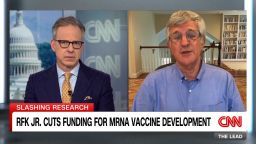President Donald Trump praised Operation Warp Speed this week as “one of the most incredible things ever done in this country,” just a day after Robert F. Kennedy Jr., the Secretary of Health and Human Services, announced the cancellation of $500 million in federal investments in mRNA vaccine technology. This decision, made under the Biomedical Advanced Research and Development Authority, has sparked significant concern among vaccine and public health experts, who warn it could leave the United States unprepared for future health crises.
Kennedy’s announcement indicated that no new mRNA projects would be initiated, which experts argue could hinder rapid vaccine development in response to pandemics or bioweapons. Notably, Kennedy has faced criticism for his history of spreading misinformation about vaccines, suggesting that mRNA technology is ineffective and unsafe. These claims have raised alarms among health professionals, who fear that such rhetoric may stifle innovation in vaccine development beyond the immediate cuts.
In his statement, Kennedy emphasized a shift in focus towards “safer, broader vaccine platforms” such as whole virus vaccines, which employ weakened or deactivated viruses to stimulate immune responses. While some countries, like China, have developed whole virus COVID-19 vaccines, studies have indicated they are less effective than mRNA counterparts.
Dr. Cynthia Leifer, a professor of immunology at Cornell University, criticized the decision, likening it to starting a kitchen remodel and halting construction after the walls are torn down. “You’d be out your money and you don’t have a kitchen,” she remarked, underscoring the importance of continuing mRNA research.
The mRNA vaccine platform has been hailed for its adaptability in pandemic situations. Dr. Jennifer Nuzzo, an epidemiologist and director of the Pandemic Center at Brown University School of Public Health, noted that mRNA vaccines can be developed in days, rather than the months required for traditional methods. She explained that this flexibility is crucial, particularly when the next pandemic’s cause remains uncertain.
Dr. Michael Osterholm, an epidemiologist at the University of Minnesota, described the funding cuts as one of the worst public health decisions in decades. He emphasized that vaccines represent a small part of the pharmaceutical industry and that government funding is essential to drive vaccine development. With the recent decision, Osterholm warned that the U.S. might find itself lagging in vaccination efforts during future outbreaks.
While it is uncertain whether another pandemic will occur during Trump’s administration, Nuzzo pointed out that the reduction in investment in mRNA vaccines could send a detrimental signal regarding U.S. readiness for biological threats. “Defense posturing and defense preparation are the best form of deterrence for a biological attack,” she stated.
The push to enhance domestic drug manufacturing, a priority for Trump administration leaders, may be counteracted by the decision to cut mRNA funding. Dr. Katalin Karikó, who was awarded the 2023 Nobel Prize for her pioneering work in mRNA technology, expressed concern that scientists may seek opportunities elsewhere if the U.S. does not continue to invest in innovative research. “It is really the next generation that will suffer the most,” she noted.
The implications of these funding cuts extend beyond immediate vaccine development. Experts warn that the U.S. may become increasingly vulnerable to health threats, both natural and man-made, unless substantial investments are made in cutting-edge vaccine technologies. As the nation reflects on its pandemic response, the need for robust vaccine research and development has never been clearer.
